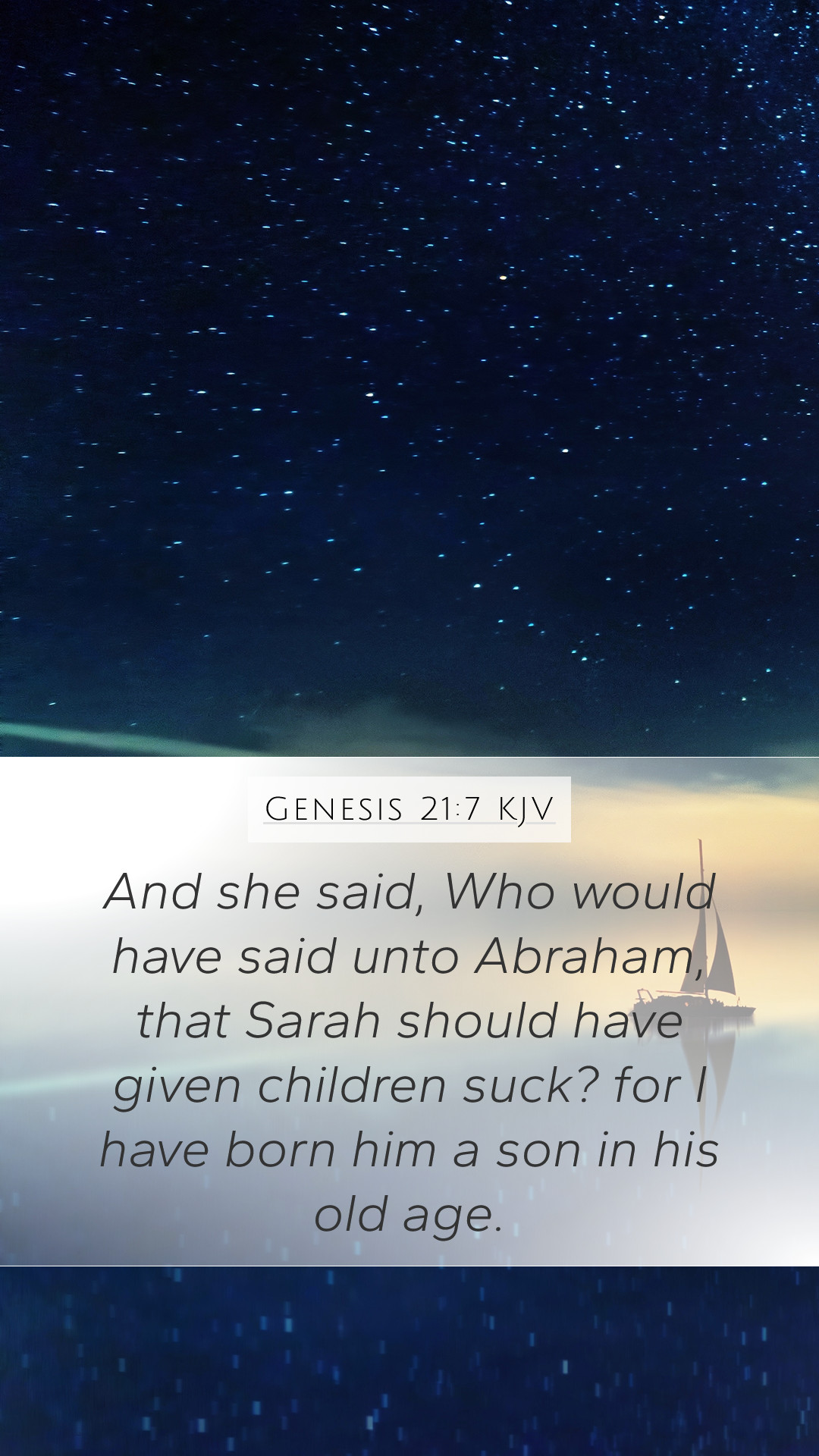Understanding Genesis 21:7 - Commentary and Insights
Genesis 21:7 reads: "And she said, Who would have said unto Abraham, That Sarah should have given children suck? For I have borne him a son in his old age." This verse encapsulates the joy and amazement of Sarah as she reflects on the miraculous birth of her son Isaac at an age well beyond her expectations. It captures the essence of divine intervention and the fulfillment of God's promises.
Summary of Biblical Context
This verse is set in the narrative of Abraham and Sarah, where God had promised Abraham that he would be the father of many nations. Despite their old age and Sarah's previous barrenness, God enabled Sarah to conceive and bear a son, signifying the beginning of the fulfillment of His covenant with Abraham.
Insights from Commentaries
-
Matthew Henry:
Henry emphasizes the improbability of Sarah’s situation, noting her disbelief and the eventual realization of God’s faithfulness. He points out that her joy is rooted in the miraculous nature of God's promise coming to fruition, stating that her laughter of despair turned into laughter of joy when Isaac was born.
-
Albert Barnes:
Barnes discusses how the statement reflects Sarah's surprise and wonderment at God’s grace, identifying her as the beneficiary of a divine miracle. The birth of Isaac signifies the hope for the barren and reassures of God’s overarching plan for humanity through Abraham's lineage.
-
Adam Clarke:
Clarke elaborates on the cultural significance of nursing children in ancient times, conveying that this act is both personal and communal. The surprise articulated in Sarah's words speaks to the global implications of Isaac's birth, reinforcing the notion that God's plans transcend human limitations.
Theological Significance
Genesis 21:7 is not merely a statement of fact regarding Sarah's experience but also serves as a profound theological reflection on the nature of God’s promises. The verse encapsulates themes of:
- Divine Timing: God’s promises are often fulfilled at the most unexpected times.
- Faithfulness: Despite Sarah and Abraham's doubts, God remained faithful to His covenant with them.
- Miraculous Birth: The birth of Isaac is a foreshadowing of the miraculous, pivotal births illustrated throughout Scripture, pointing ultimately towards Jesus Christ.
Application and Reflection
For contemporary readers, this verse prompts reflection on the faithfulness of God during times of personal barrenness—whether emotional, spiritual, or relational. It encourages believers to trust in God’s timing and to remain hopeful in bringing forth new beginnings in their lives.
Related Bible Verses
- Hebrews 11:11-12: This passage highlights Sarah's faith in God’s promise, explaining that she conceived by faith despite her old age.
- Genesis 17:16: God promises Abraham that Sarah would bear him a son, establishing a connection with the covenant.
- Isaiah 51:2: This verse references the origin of Israel’s blessings through the line of Abraham and Sarah.
- Luke 1:37: "For nothing will be impossible with God," reinforces the theme of divine possibilities beyond human capacities.
- Romans 4:19-21: Paul speaks of Abraham’s faith, which mirrors Sarah’s joy in the fulfillment of God’s promise.
Conclusion
Genesis 21:7 invites readers to explore the depths of faith and divine promise. It encourages a deeper understanding of Scripture, providing insight into the importance of God’s covenant with Abraham and the miraculous faithfulness shown through Sarah’s experience. Through analyzing this verse, one gains valuable Bible study insights that can enrich personal faith and understanding of God’s timely work in lives.


